Sometimes the smallest things can cause the biggest problems.
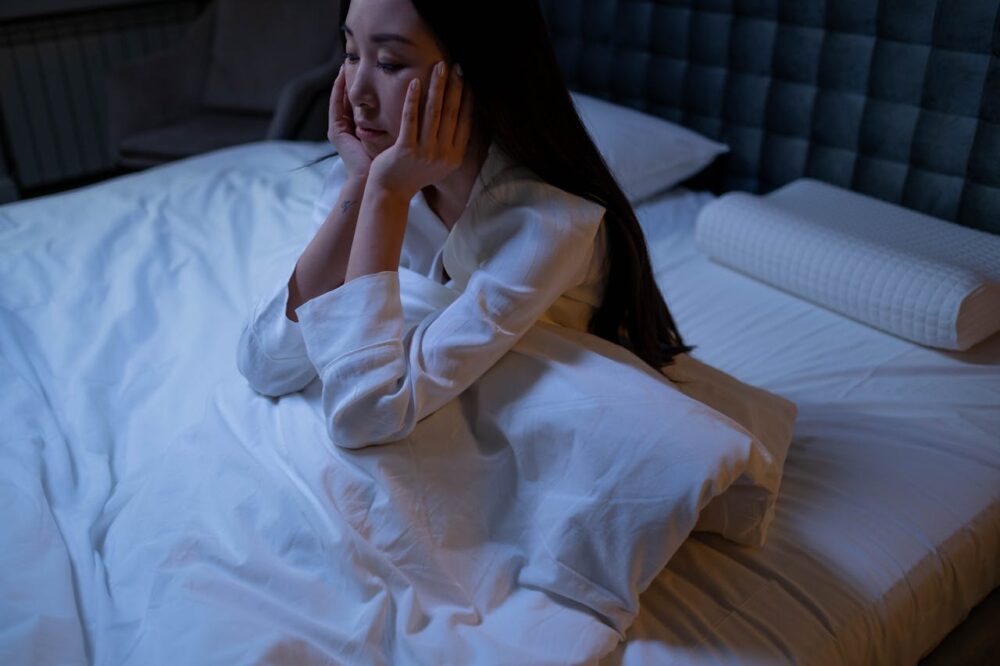
A good hotel room promises a sanctuary of comfort and quiet, a place to rest and recharge after a long day of travel or exploration. But a peaceful night’s sleep can be sabotaged by a single, seemingly minor detail that you don’t notice until it’s too late. It’s the kind of small oversight in design or placement that can turn a dream room into a sleepless nightmare.
These are the red flags to look for that can signal you’re in for a long, restless night.
1. The air conditioner rumbles like a freight train.
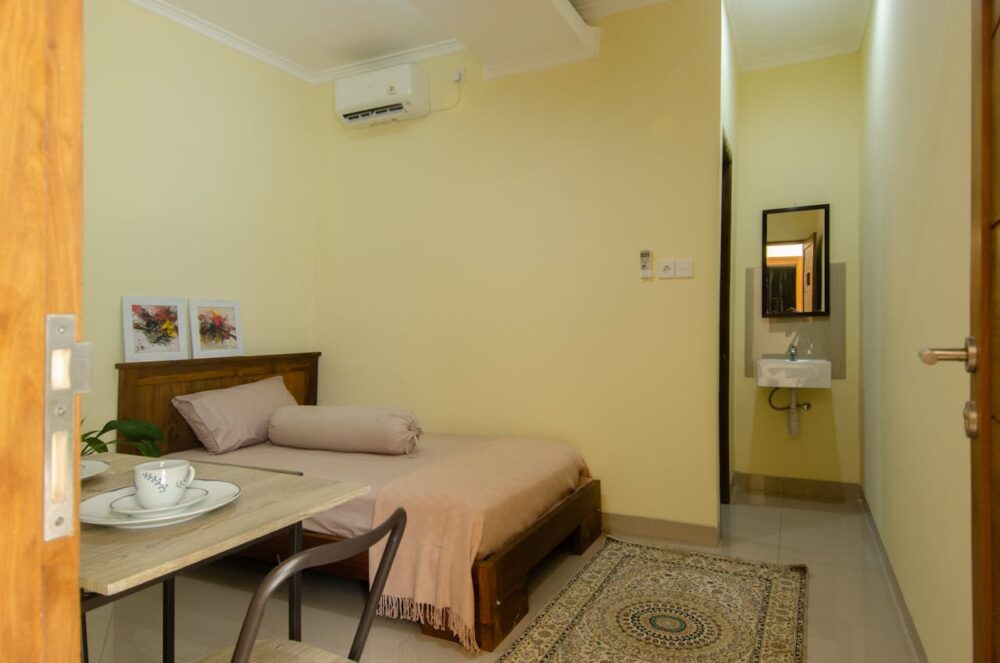
You check in and the room is a perfectly cool oasis, a welcome escape from the summer heat. But when you’re lying in bed in the dead of night, the room’s ancient, wall-unit air conditioner roars to life. It’s not a gentle hum; it’s a loud, shuddering groan followed by a rattling that sounds like a box of loose bolts. The entire room seems to vibrate with the effort.
This leaves you with an impossible choice: turn it off and spend the rest of the night slowly roasting in a stuffy, airless room, or endure the intermittent, sleep-shattering noise of the compressor kicking on every twenty minutes, as mentioned in CN Traveler. Either way, a night of deep, restful sleep is completely out of the question, all thanks to that one ancient appliance.
2. Your window directly overlooks the hotel’s courtyard or pool.

A room with a view of the pool or a lively central courtyard can seem like a nice perk when you check in during the day. The problem is that these communal spaces are often the social heart of the hotel and a major source of noise. The pool area can be filled with excited, screaming kids early in the morning, while a courtyard with a bar or restaurant can be home to loud partiers late into the night, according to CNN.
The sounds from these hard-surfaced, echo-prone spaces travel directly up into your room. What seemed like a desirable view has now become your personal, all-night noise machine. A room at the back of the hotel, overlooking the parking lot, is often a much quieter and better choice.
3. You are located right next to the ice machine or the elevator.

The location of your room within the hotel is just as important as the room itself. Being placed right next to the elevator bank or the communal ice machine is a recipe for a sleepless night, especially for a light sleeper. These are the highest-traffic areas on any hotel floor, and they are in use 24/7. You will be treated to a constant soundtrack of conversations, dings, and rumbling luggage, as shared in Forbes.
The ice machine is particularly bad, with its loud, crashing cycle of dropping ice at all hours of the night. When you are checking in, it is always a smart move to politely request a room that is located in the middle of the hallway, as far away from these noisy utility areas as possible.
4. The thermostat on the wall is a complete illusion.
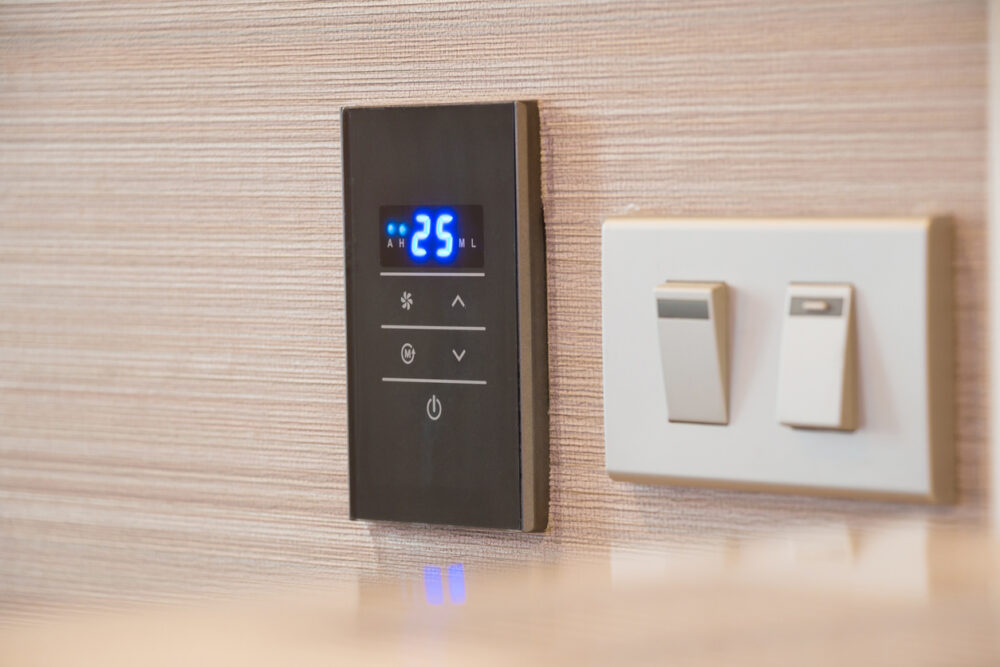
There is nothing worse than being in a hotel room that is too hot or too stuffy to sleep in. A common and infuriating detail is the “dummy” thermostat. Many hotels install thermostats that look like they give you full control over the temperature, but they are actually centrally controlled and have a very limited range, or they do nothing at all. This is a cost-saving measure for the hotel.
You are left to spend the night sweating and frustrated, unable to get the room to the cool temperature you need for a good night’s sleep. It’s a small deception that can have a big impact on your comfort.
5. The curtains have that one, infuriating little gap.
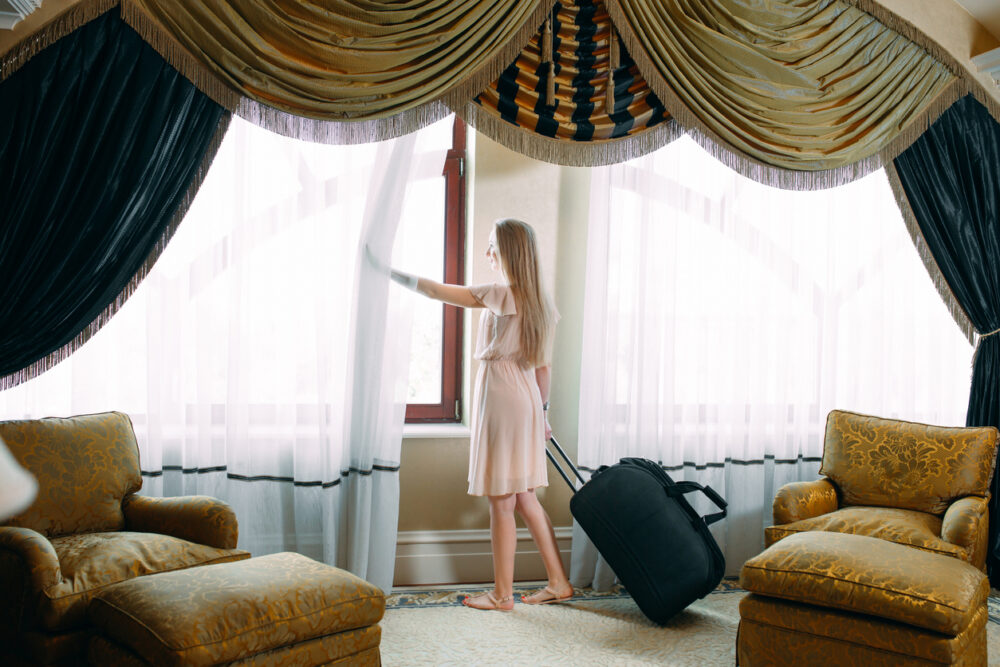
You’ve turned off all the lights and you’re ready for sleep, but there is a single, laser-like beam of light cutting across the dark room. It’s that classic hotel problem: the blackout curtains that don’t quite overlap in the middle, leaving a small but incredibly bright gap. This allows the light from a hallway or a parking lot to stream directly into the room, right at eye level.
For anyone who needs a truly dark room to sleep, this is a maddening detail that can completely disrupt your sleep cycle. Many seasoned travelers pack a simple clothespin or a binder clip for this very reason.
6. The mini-fridge has a death rattle.
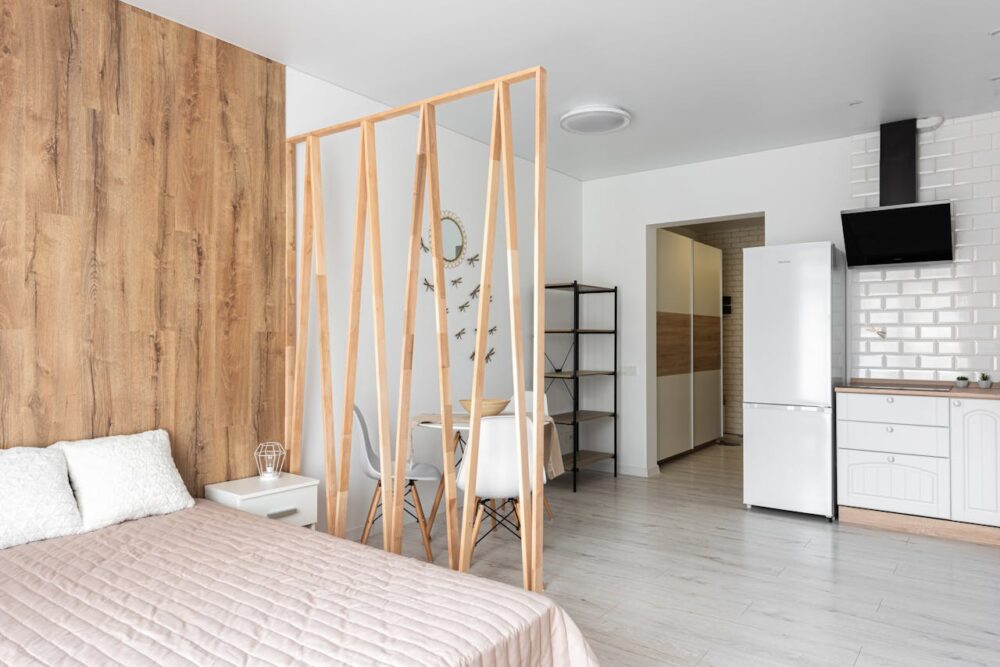
A mini-fridge in a hotel room is a great convenience, but an old or poorly maintained one can be a noisy monster. These small refrigerators often have a loud and rattling compressor that will cycle on and off throughout the entire night. Just as you are drifting off to sleep, the fridge will suddenly roar to life with a loud hum or a series of clicks and clunks.
This intermittent, unpredictable noise is incredibly disruptive to sleep. One of the first things a light sleeper should do when they get to a room is to simply unplug the mini-fridge for the night.
7. A motion-sensor light is in a terrible location.
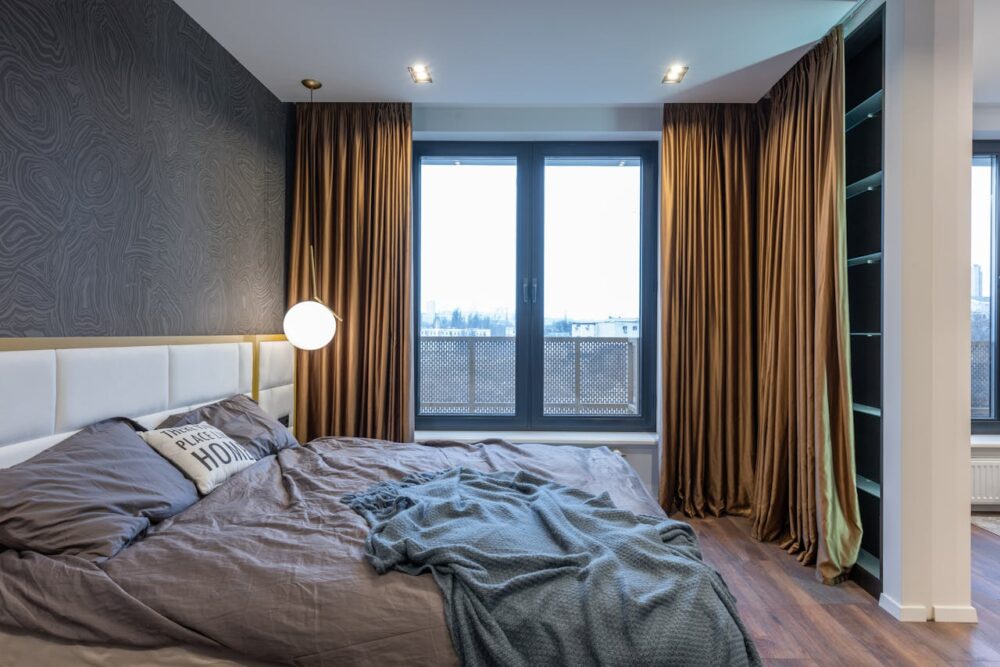
Motion-sensor lights and thermostats are becoming more common as an energy-saving feature in modern hotels. They are a great idea in theory, but they can be a nightmare in practice if they are poorly implemented. A motion sensor for the bathroom light that is too sensitive can be triggered by you simply rolling over in the bed, suddenly flooding the dark room with a blast of bright light.
Similarly, a motion-sensor thermostat can cause the air conditioning to turn off in the middle of the night, causing you to wake up in a hot, stuffy room. These “smart” features can often be very dumb.
8. Your room is directly underneath the gym.

Being placed in a room on the floor directly below the hotel’s 24-hour fitness center is another classic “bad luck” location. You will be treated to the sound of an early-morning runner pounding on the treadmill above you at 5 a.m., which can sound like a herd of elephants in your room. You will also hear the constant thud of weights being dropped on the floor.
This is a specific type of noise that is particularly jarring and disruptive. It’s another great reason to request a room on a high floor, away from the hotel’s communal amenity spaces, to ensure a peaceful and quiet night.
9. You spot a suspicious stain on the comforter or sheets.
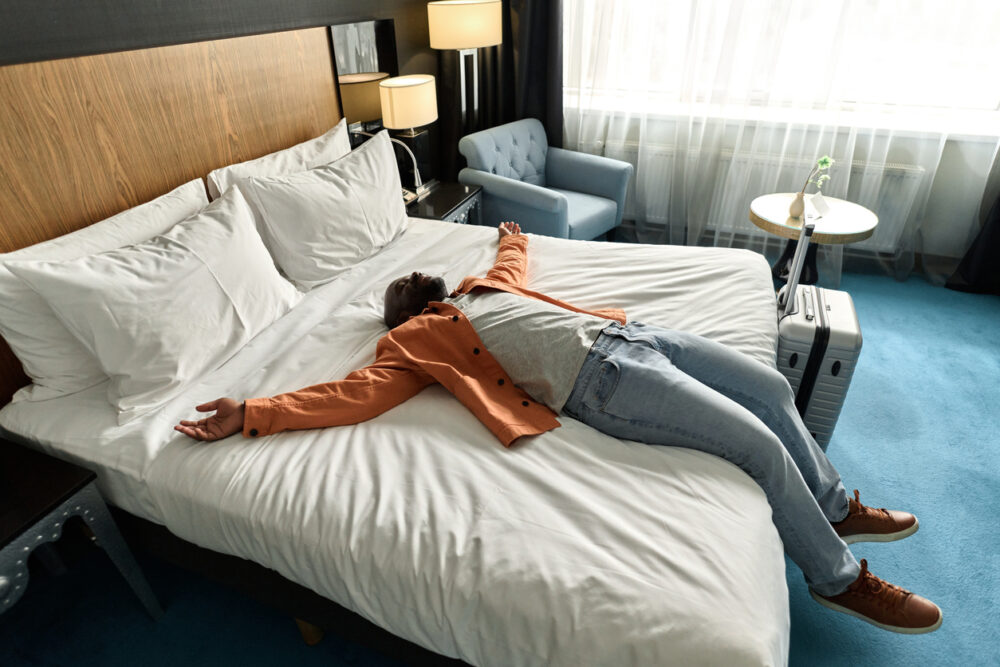
You pull back the heavy decorative comforter, ready to settle in for the night, and then you see it: a small but unmistakable stain on the “clean” sheets or duvet. It’s a detail that completely shatters the illusion of a pristine, sanitized hotel room. Your mind immediately starts racing, wondering what the stain could be and, more importantly, what other, less visible things were not properly cleaned.
Even if you call housekeeping and have them change the linens, the damage is done. You will spend the rest of the night unable to relax, feeling a sense of unease and disgust every time you pull the covers up. Sleep is impossible when you are questioning the cleanliness of the very bed you are lying in.
10. The electronic lock shows a record of unexplained keycard attempts.
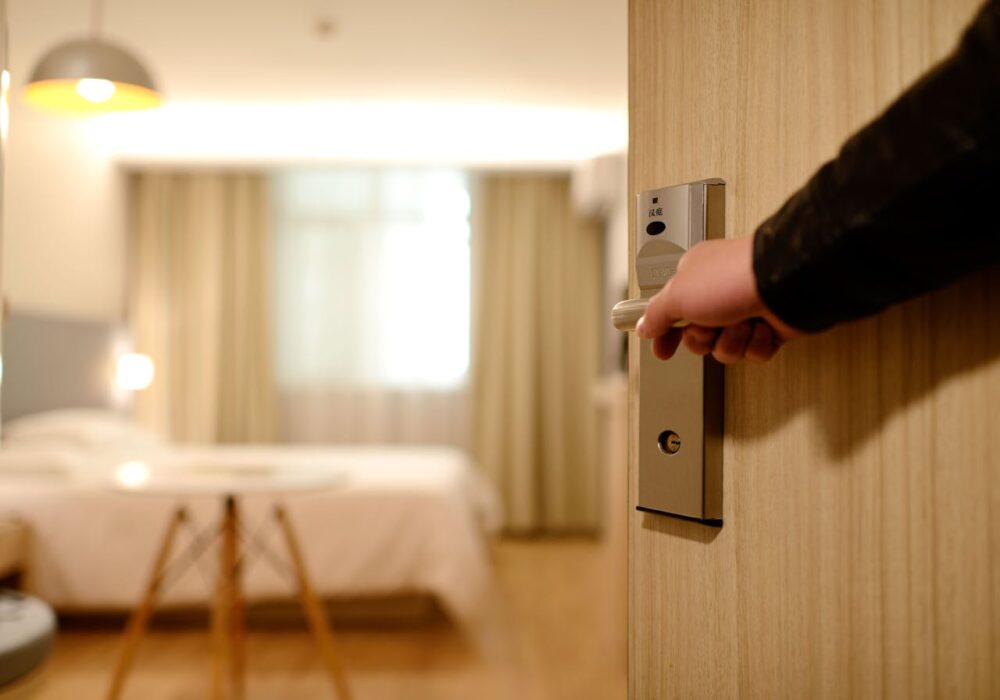
This is a particularly modern and unsettling discovery. Some hotel door locks have a feature that can show a log of recent access attempts. If you notice a series of “denied entry” records at odd hours, it means someone has been actively trying to use a keycard to get into your room while you were out. It’s a chilling sign that your room may have been targeted for some reason.
Once you know that someone has been trying your door, your room no longer feels like a secure and private sanctuary. You will be on high alert all night, jumping at every small noise in the hallway and wondering if they might come back. A restful sleep is out of the question when you feel you are not safe.
11. The peephole on your door is missing or has been blocked.

The peephole is a simple, fundamental security feature that allows you to verify who is on the other side of your door before you open it. Discovering that the peephole on your hotel room door is missing, painted over, or has been deliberately blocked with a piece of paper is a massive and immediate red flag. It leaves you completely blind and vulnerable to anyone who might knock.
This seemingly small detail completely erodes your sense of security. Every unexpected noise or knock at the door, whether it’s late-night revelers or a potential threat, becomes a source of significant anxiety. It’s impossible to sleep soundly when you feel exposed and unsafe in your own room.
